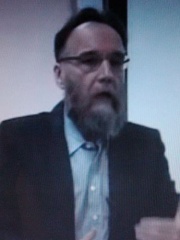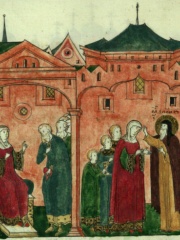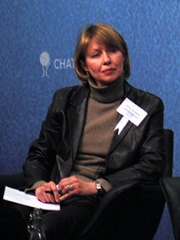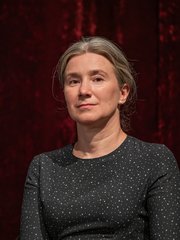



The Most Famous
POLITICAL SCIENTISTS from Russia
This page contains a list of the greatest Russian Political Scientists. The pantheon dataset contains 46 Political Scientists, 4 of which were born in Russia. This makes Russia the birth place of the 3rd most number of Political Scientists behind United States, and Germany.
Top 4
The following people are considered by Pantheon to be the most legendary Russian Political Scientists of all time. This list of famous Russian Political Scientists is sorted by HPI (Historical Popularity Index), a metric that aggregates information on a biography's online popularity.

1. Aleksandr Dugin (b. 1962)
With an HPI of 70.18, Aleksandr Dugin is the most famous Russian Political Scientist. His biography has been translated into 57 different languages on wikipedia.
Aleksandr Gelyevich Dugin (Russian: Александр Гельевич Дугин; born 7 January 1962) is a Russian far-right political philosopher. He is the leading theorist of Russian neo-Eurasianism. Born into a military intelligence family, Dugin was an anti-communist dissident during the 1980s, and joined the far-right Pamyat organization. After the dissolution of the Soviet Union, he co-founded the National Bolshevik Party, which espoused National Bolshevism, with Eduard Limonov in 1993 before leaving in 1998. In 1997, Dugin published his most well-known work, Foundations of Geopolitics, in which he called on Russia to rebuild its influence through alliances and conquest in order to challenge a purported rival Atlanticist empire led by the United States. Dugin founded the Eurasia Party in 2002, and continued to develop his ideology in books including The Fourth Political Theory (2009). His views have been characterized as fascist or neo-fascist, although he explicitly rejects fascism along with liberal democracy and Marxism, instead advocating a "conservative revolution" against Enlightenment ideas in Russia. He has drawn on the writings of René Guénon, Julius Evola, Carl Schmitt, and Martin Heidegger. Dugin was an early advisor to Gennadiy Seleznyov and later Sergey Naryshkin. He served as head of the Department of Sociology of International Relations at Moscow State University from 2009 to 2014, when he lost his post due to backlash after he called for the death of pro-Maidan Ukrainians. Since 2023, he has served as the director of the Ivan Ilyin Higher School of Politics at the Russian State University for the Humanities. Dugin is a strong supporter of Russian president Vladimir Putin. Although he has no official ties to the Kremlin, he is often referred to in foreign media as "Putin's brain"; others say that his influence has been greatly exaggerated. Dugin vocally supported the 2014 Russian annexation of Crimea and the 2022 invasion of Ukraine. His daughter, Darya, was assassinated in a car bombing on 20 August 2022. The assassination is widely believed to have been conducted by Ukraine, though the exact relation of the assassins to the Ukrainian government is undetermined.

2. Marfa Boretskaya (1450 - 1503)
With an HPI of 57.86, Marfa Boretskaya is the 2nd most famous Russian Political Scientist. Her biography has been translated into 18 different languages.
Marfa Boretskaya (Russian: Марфа Борецкая), also known as Martha the Mayoress (Russian: Марфа Посадница, romanized: Marfa Posadnitsa), was a Russian businesswoman and noblewoman. She was the wife of Isaak Boretsky, the posadnik of Novgorod from 1438 to 1439 and again from 1453. According to legend and historical tradition, she led the republic's struggle against Moscow between her husband's death and the city's final annexation by Grand Prince Ivan III in 1478.

3. Alena V. Ledeneva (b. 1964)
With an HPI of 44.79, Alena V. Ledeneva is the 3rd most famous Russian Political Scientist. Her biography has been translated into 17 different languages.
Alena Valeryevna Ledeneva (Russian: Алёна Валерьевна Леденёва; born May 1964) is a Russian academic known for her studies of corruption and informal practices in Russia, particularly blat. She is currently Professor of Politics and Society at the School of Slavonic and East European Studies (SSEES), University College London (UCL).

4. Ekaterina Schulmann (b. 1978)
With an HPI of 44.56, Ekaterina Schulmann is the 4th most famous Russian Political Scientist. Her biography has been translated into 17 different languages.
Ekaterina Mikhailovna Schulmann (Russian: Екатерина Михайловна Шульман, Yekaterina Mikhaylovna Shulman; née Zaslavskaya (Заславская); born 19 August 1978) is a Russian political scientist specializing in legislative processes. Schulmann was a senior lecturer at RANEPA from 2013 to 2022 and an associate professor at the Moscow School for the Social and Economic Sciences from 2021 to 2022. She is currently a fellow of the Robert Bosch Academy Berlin, an associate fellow of Chatham House, a non-resident scholar at the Carnegie Russia Eurasia Center in Berlin, and an invited lecturer at the Institute for East European Studies of the Free University of Berlin. She works as a lecturer and political commentator, gives expert commentary to the media, and hosts her own political radio talk show. As of August 2022, her YouTube channel has one million subscribers.
People
Pantheon has 4 people classified as Russian political scientists born between 1450 and 1978. Of these 4, 3 (75.00%) of them are still alive today. The most famous living Russian political scientists include Aleksandr Dugin, Alena V. Ledeneva, and Ekaterina Schulmann. The most famous deceased Russian political scientists include Marfa Boretskaya. As of April 2024, 1 new Russian political scientists have been added to Pantheon including Ekaterina Schulmann.
Living Russian Political Scientists
Go to all RankingsAleksandr Dugin
1962 - Present
HPI: 70.18
Alena V. Ledeneva
1964 - Present
HPI: 44.79
Ekaterina Schulmann
1978 - Present
HPI: 44.56

